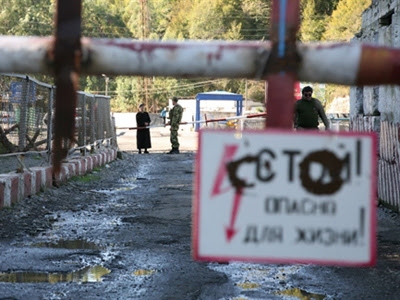Geneva Talks Discuss Fatal Shooting on Georgia-Abkhaz Border
GENEVA - The main topic of discussion at Wednesday’s Geneva talks between representatives from Abkhazia, Georgia, Russia, the UN, EU and OSCE was a fatal shooting in the village of Khurcha that left one Georgian citizen dead.
Rashid Kanjioghli, an Abkhaz border guard, serving near the Khurcha-Nabakevi checkpoint on the contact line that separates the Russian-backed breakaway region of Abkhazia from the rest of Georgia shot and killed 31-year-old Georgian citizen Giga Otkhozoria after he attempted to cross the administrative border to attend his aunt’s funeral.
Kanjioghli allegedly shot Otkhozoria six times, including a fatal shot to the head, after he and three other Abkhaz border guards illegally pursued the victim back across to the Georgian side of the separation line.
Georgia’s Prosecutor General requested that the court hold Kanjioghli in pre-trial detention once he is apprehended by Georgian authorities.
The separatist Abkhaz authorities claimed the incident at the checkpoint occurred after Otkhozoria was denied entry into Abkhazia because he did not have the necessary travel documents. Abkhaz officials, however, offered no explanation as to why Otkhozoria was shot and killed on the Georgian side of the border.
Abkhazia’s Russian-backed military prosecutor said Abkhaz authorities would launch a criminal investigation into the incident, though no such procedure or arrests have been initiated since the announcement.
The EU, UN and OSCE envoys that chair the Geneva talks called for a swift and objective investigation, with all sides taken part in the inquiry.
Georgia’s Foreign Ministry said that Tbilisi has demanded from both the Russians and Abkhaz that Kanjioghli must be arrested immediately.
“Regrettably, the representatives of the occupation regime [Abkhaz authorities] provided no valuable information regarding the case,” the MFA released after the meeting.
Following the meeting, Georgian Deputy Foreign Minister David Dondua announced that the Abkhaz side was acting irresponsibly in their approach to the case. He added that all of the participants in the talks, including the Russians, called on the rebel representatives to arrest Kanjioghli.
Abkhazia’s de facto foreign ministry claimed that an investigation was ongoing, but demanded that Tbilisi stop trying to politicize the case.
Russia’s Deputy Foreign Minister and Geneva talks representative, Grigory Karasin, expressed hope that the Abkhaz authorities will begin and investigation and provide full information about their findings at the next meeting of the Incident Prevention and Response Mechanism on July 6.
Georgian Prime Minister Giorgi Kvirikashvili said on June 6 that the failure of the Abkhaz side to bring any charges against Kanjioghli for the murder of a Georgian citizen deeply complicates the prospect of continuing constructive talks.
Representatives from Abkhazia, Georgia, Russia, the UN and OSCE sat down around the negotiation table for the first time in four years in Abkhazia’s Gali district on May 27.
In April 2012, Abkhazia’s Foreign Ministry released a statement accusing the European Union Monitoring Mission of ignored their requests and continued to carry out independent checks without notifying the separatist government and their Russian patrons. Direct talks between the sides were suspended when the rebel authorities in the Abkhaz capital Sukhumi filed a formal protest.
Immediately following the collapse of the Soviet Union, Russian-backed rebels in Abkhazia broke away from Georgia. Moscow occupied and effectively annexed the area, as well as Georgia’s other breakaway South Ossetia region.
Moscow recognized South Ossetia and the other occupied Abkhazia region as independent states following the 2008 war.
International law and the United Nations continue to state that the regions remain part of Georgia.
By Tamar Svanidze
Edited by Nicholas Waller












